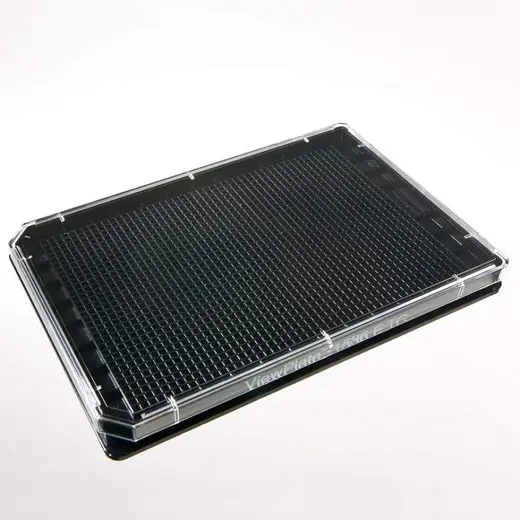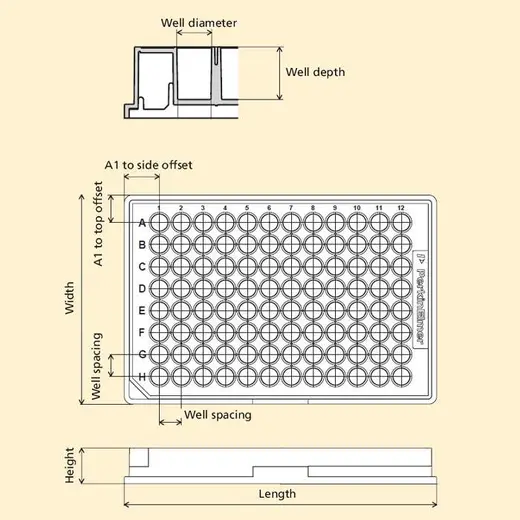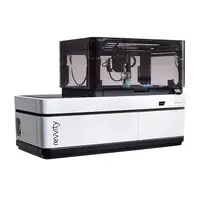
ViewPlate-1536 Collagen Coated, Black, Optically Clear Bottom, Tissue Culture Treated, Sterile, 1536-Well with Lid, Case of 10








1536-well collagen-coated, tissue culture-treated (TC-treated) sterile microplate with black well walls and an optically clear bottom for cell-based assays.
For research use only, not for use in diagnostic procedures.
Product information
Overview
Revvity's ViewPlate microplates are engineered for bottom reading systems and microscopic viewing of cells. This high quality microplate can be utilized in your cell based assay for superior results
Extracellular matrix proteins such as collagen provide an attachment framework for the adhesion and growth of certain cell types in vivo, and can also be used for cell attachment to plate surfaces in vitro. Cellular fibronectin membrane proteins mediate the attachment of cells to collagen substrates. Collagen is the most abundant protein in mammals that is found throughout the body and is a major component of the extracellular matrix (ECM). The most frequently used types of collagen for coating are collagen I and IV. Collagen type I is suitable for endothelial and epithelial cells, muscle cells and hepatocytes. Collagen type IV is the major constituent of basement membranes and offers more physiologically relevant conditions to cells as well as improving the adherence of specific cell types i.e. PC-12 (rat adrenal pheochromocytoma cell line). Our catalog plates are coated with rat tail collagen Type I.
Leveraging years of assay and instrument experience in plate detection, Revvity designs better Microplates for better performance that guarantees better results for all Revvity applications.
Packaging Notes:
- Cases of ten 1536-well plates are packaged as 2 sleeves of 10 plates each, lids included.
- Cases of forty 1536-well plates are packaged as 4 sleeves of 10 lidded plates each, lids included.
Additional product information
Well plate dimensions
Well format: 1536-well
| Description | Specification |
|---|---|
| Number of rows | 32 |
| Number of columns | 48 |
| Well volume | 12 µL |
| Recommended working volume | 4 µL- 12 µL |
| Height (mm) | 10.4 |
| Length (mm) | 127.76 |
| Width (mm) | 85.48 |
| Well diameter (mm) | 1.53 |
| Well depth (mm) | 5 |
| A1 to top offset (mm) | 7.87 |
| A1 to side offset (mm) | 11.01 |
| Well-to-well spacing (mm) | 2.25 |
Specifications
| Color |
Black/Clear Bottom
|
|---|---|
| Well Format |
1536.0 well plate
|
| Application |
Cell Culture
Imaging
Radiometric
Research
|
|---|---|
| Automation Compatible |
Yes
|
| Brand |
ViewPlate
|
| Coating Treatment |
Collagen
Sterile
|
| Detection Method |
Confocal Imaging
Fluorescence
High Content Imaging
Luminescence
Radiometric
Time-Resolved Fluorescence (TRF & TR-FRET)
|
| Format |
Microplates
|
| Material |
Polystyrene
|
| One Unit Contains |
1.0 case(s)
|
| Shipping Conditions |
Shipped Ambient
|
| Sterility |
Aseptic
|
| Unit Size |
Case of 10
|
Resources
We know you are working hard to produce the next big breakthrough and the last thing you need to worry about is sub-par quality...
Your specific applications deserve the best microplates!
For a researcher, the need to select the most suitable application...
Revvity’s CulturPlates and PhenoPlates are specifically designed to promote cell attachment and growth. These microplates are...

SDS, COAs, Manuals and more
Are you looking for technical documents for this product. We have housed them in a dedicated section., click on the links below to explore.


How can we help you?
We are here to answer your questions.































